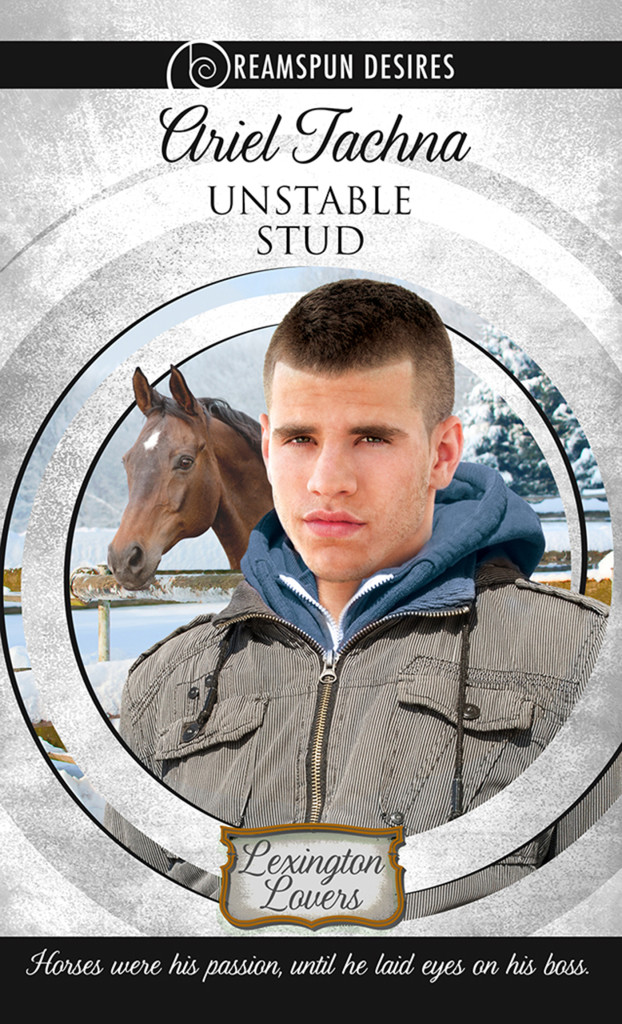Today we are happy to say hi to author Ariel Tachna joining us here at Love Bytes to talk about her new release “Unstable Stud”, which is part of the Dreamspinner Press, Dreamspun Desires Collection.
Welcome Ariel 🙂
Secondary characters – bringing a world to life
It’s easy as romance writers to focus on our main characters, the two people who are going to fall in love and spend the rest of their lives together happily ever after. Or happily for now if that’s the ending that floats your boat. We know those characters forward and backward and inside out, sometimes better than they know themselves because we see them clearly in a way they can’t see themselves. But love—and our main characters—don’t exist in a vacuum. Unless the story takes place on a spaceship with no one but the two main characters, they’re going to interact with someone other than each other, and those interactions are going to tell the reader something about the protagonists and about the world in which they live. And if those secondary characters are around enough, they need to take on lives and personalities of their own.
Think about the Council of Elrond in Fellowship of the Ring. We have a great council of men, dwarves, elves, a hobbit, and a wizard. But we only have ten named characters. Gloín, Gimli’s father who has a story of his own and a role in The Hobbit, isn’t named except as a way to identify Gimli. Glorfindel, the Balrog Slayer, hero of Gondolin reborn into the Third Age, isn’t named. Why? Because while they are there and undoubtedly have thoughts and feelings about the discovery of the One Ring and the quest that is to follow, their thoughts and feelings don’t impact the decisions of the named characters beyond the few lines they might throw out in an argument so raucous that it’s impossible to know who said what.
Until the voice of one tiny hobbit cuts through the din and silences them all. (But that’s another discussion for another time.)
Obviously the Nine Walkers are named characters. We follow their respective fates all the way to the very end. But there are ten named characters at the Council of Elrond. Elrond, Lord of Imladris, also has a name. Because he is lord of the lands, because he is an elf of great age and wisdom, because he leads the council, but also because he has information that no one else has. He lived the story of the first War of the Ring, something none of the others at the council can say. Maybe they’ve heard the stories, maybe they haven’t, but they weren’t there. Elrond brings something unique to the table, and so he isn’t just a face in the crowd.
As writers, that’s a decision we must make in each scene we write. Who are the faces in the crowd, no more than a blur in passing? Who are the people who contribute something by virtue of their job description (the nurse bringing Luke his prognosis when he gets sick) without impacting the protagonists on a personal level? And who are the people whose very presence enriches the scene the way those people enrich the lives of the main characters?
For Unstable Stud, those people are Mrs. Twitchell, Luke’s landlady and surrogate grandmother, Joe Bryant, the trainer at Bywater Farm, and of course, King of Hearts, the horse who brings Luke and Clay together. Mrs. Twitchell was a particular joy to write.
Blurb
Horses were his passion, until he laid eyes on his boss.
Eighteen months ago, tragedy struck Bywater Farm when a riding accident killed Clay Hunter’s lover and traumatized his prize horse, King of Hearts. Clay and King lingered in limbo, surviving but not really living, until a breath of fresh air in the form of Luke Davis, a new groom in the stud barn, revives them both.
When a fall from King’s back sends Luke to the emergency room, Clay watches the shaky foundation of their budding relationship tumble down. Can Clay really love a jockey again, or will his fear of losing another man he loves keep them apart for good?
Buy links:
Dreamspinner Press paperback
Luke put down the kickstand of his scooter and set his helmet on the seat. Mrs. Twitchell, his landlady, had offered him a corner of the garage when she realized he rode a scooter rather than driving a car, so he didn’t have to worry about his helmet disappearing during the night. He chafed his fingers through his thick gloves and prayed for spring to hurry up. He didn’t know how much more of winter he could stand.
“Luke, come warm up. I have the fire going, and tea is ready.”
Luke looked up and smiled when he saw Mrs. Twitchell standing in the door that connected the garage to the rest of the house. “I should put my coat upstairs,” he said, starting toward the other door that led to his little apartment above the garage.
“Nonsense. You’ll just get cold again coming back downstairs. It’s not snowing, so your coat isn’t wet. It can hang in my kitchen for a few hours. Now come have tea.”
Luke followed her obediently into the mudroom that led to the kitchen. He hung his coat and scarf on her coatrack by the door and took off his boots so he wouldn’t track mud or worse into her pristine kitchen. By the time he crossed the threshold, she had his tea poured and was adding two cubes of sugar, just the way he liked it.
“Come, sit down and warm up,” she said. “I made peanut brittle today. It’s a new recipe. You must tell me what you think. I’m a terrible judge of new recipes.”
She said that, but Luke had yet to eat anything at her table that wasn’t delicious. “I’m sure it will be wonderful.” He stirred his tea and took a sip, letting the heat and caffeine chase away the cold from the ride home. It hadn’t been a particularly brutal winter by Kentucky standards, but that didn’t mean it was warm. Above freezing today, but not warm.
“Thank you. This is just what I needed,” he said before taking another sip.
Mrs. Twitchell just smiled and set a plate of peanut brittle in front of him. Luke had felt bad about letting her feed him so often when he first moved in, but he’d discovered refusing her was impossible, so he’d made peace with it by doing odd jobs around the house for her. He mowed the yard, raked the leaves, shoveled the driveway when it snowed, and generally made himself as useful as possible. She told him regularly he didn’t need to do those things, but he always brought her around by insisting his mother had raised him better than that.
“What do you think?” she asked when Luke took a bite.
“It’s delicious,” he said around his mouthful of crunchy, buttery heaven. “I don’t know how you do it, but every recipe you try is better than the last.”
“Motivation,” Mrs. Twitchell said. “If I keep making good things, you’ll keep joining me for tea or dinner. I like having company.”
 When Ariel Tachna was twelve years old, she discovered two things: the French language and romance novels. Those two loves have defined her ever since. By the time she finished high school, she’d written four novels, none of which anyone would want to read now, featuring a young woman who was—you guessed it—bilingual. That girl was everything Ariel wanted to be at age twelve and wasn’t.
When Ariel Tachna was twelve years old, she discovered two things: the French language and romance novels. Those two loves have defined her ever since. By the time she finished high school, she’d written four novels, none of which anyone would want to read now, featuring a young woman who was—you guessed it—bilingual. That girl was everything Ariel wanted to be at age twelve and wasn’t.
She now lives on the outskirts of Houston with her husband (who also speaks French), her kids (who understand French even when they’re too lazy to speak it back), and their two dogs (who steadfastly refuse to answer any French commands).
Visit Ariel:
Website: www.arieltachna.com
Facebook: www.facebook.com/ArielTachna





